Breaking News
Solving the 100-year-old mystery of two missing Scottish soldiers

Read more on post.
Cameron Buttle and
Morgan SpenceBBC Scotland, in Loos-en-Gohelle, France
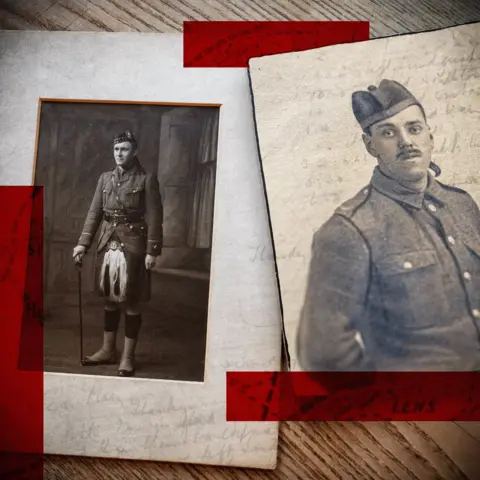 BBC
BBCFour years ago, construction workers clearing the land for a new hospital in northern France made a grim discovery.
Soon after, they had unearthed the remains of more than 100 people.
Such finds are not unusual in this part of France and the police knew exactly who to call.
Stephan Naji, the head of the recovery unit from the Commonwealth War Graves Commission (CWGC), arrived on the scene within hours.
It was the start of a painstaking investigation which eventually solved a 100-year-old mystery by identifying two missing Scottish soldiers.
Stephan runs a team of specialist archaeologists who are on standby 24/7.
Once they confirm that soldiers’ bodies have been found they remove the remains and any artefacts and extract as much information as possible.
The building site at Lens had been on the Western Front during World War One and was the scene of the Battle of Loos, one of the biggest in the conflict.
At the commission’s headquarters near Arras, Stephan showed us trays of objects which had been found there, including parts of boots, rusted belt buckles, shoulder badges, buttons and regimental insignia.
Stephan’s team analysed everything that was found.
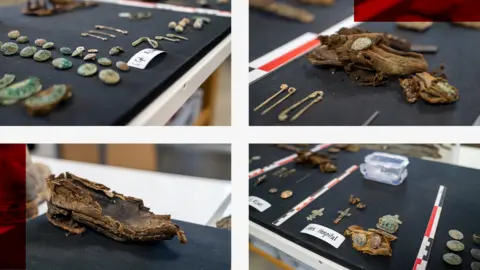
Thousands of soldiers are still missing in action in the area, and the discovery of items from individual regiments enabled them to narrow down who the individuals might be.
Shoulder badges indicated that the remains could include soldiers who had fought for two Scottish regiments – the Gordon Highlanders and the Cameron Highlanders.
But to establish who they were it was time to pass the case on to another specialist unit based in the UK.

A nondescript office block at the far end of the Imjin barracks in Gloucester is home to a small Ministry of Defence unit called the Joint Casualty and Compassionate Centre (JCCC).
The team is tasked with identifying British troops who were killed in historical campaigns.
Not many know about their work, but those who do have nicknamed them the war detectives.
Nicola Nash has been a case worker at the JCCC for 10 years.
In 2023, she was told about the remains which had been found in France two years earlier.
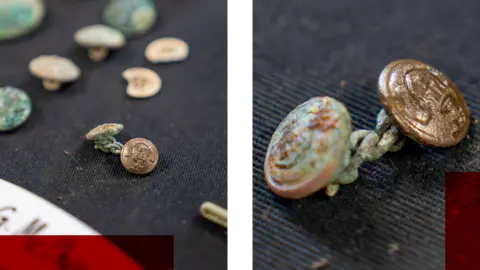
After looking at the list of the Cameron Highlander soldiers who were still missing from the Battle of Loos, Nicola narrowed the search to individual names which could be checked on the 1911 census.
Nicola also noticed an unusual detail. One of the men had been found with some tiny buttons from the Newcastle Corporation Tramways.
“That was obviously quite unusual for a Scottish soldier. I wondered if I could use those buttons to try and make an identification,” she said.

Among the handwritten names which fill the columns of the 1911 census, she found a tobacconist assistant called Gordon McPherson.
“The key information was that it’s got James, his father, and he was working as a storekeeper for the Newcastle Corporation Tramways,” said Nicola.
The team needed to be certain that the remains were those of Gordon McPherson. That meant they had to track down living relatives willing to carry out a DNA test.
“When I’ve got the name of someone who is probably alive, I will then start things like Googling them. Are there any news articles about them? Do they have a LinkedIn, can I find them on Facebook?
“It’s through this that I am able to eventually trace them,” Nicola said.
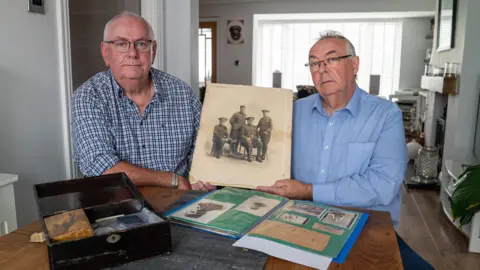
This search led to two brothers, Andrew and Alistair McPherson, from Whitley Bay in North Tyneside.
When they were boys, they had been fascinated by what they called “the black box” – a family heirloom which has been passed down the generations.
On visits to their grandparents, they would ask for the box to be brought down from the attic so they could rummage through the contents.
Inside there was a musket ball from the Boer War, medals, citations, and letters – some of which are now barely legible.
Now, with both men in their 60s, it is the heart-wrenching letters written by their great grandmother searching for her lost son that bring tears to their eyes.
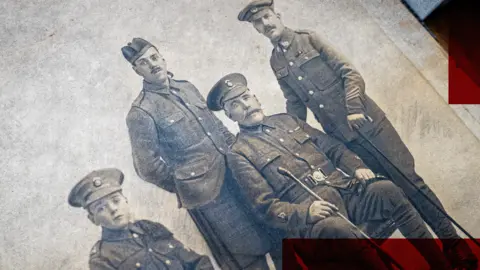
Regimental war diaries had shown that their great uncle, Gordon McPherson, had been killed on the first day of the Battle of Loos.
But his body had never been found.
Then, last year, Alistair received a letter out of the blue from the Ministry of Defence.
It said remains had been found in France which could belong to his relative.
“I was shaking like a leaf,” Alistair recalls.
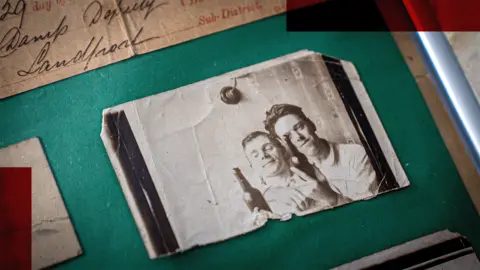
The letter, from Nicola Nash, said it was believed the body could be Gordon’s because two buttons from the Newcastle Corporation Tramways had been discovered with the remains.
“My great-grandfather was the chief inspector of Newcastle Tramway, so our assumption is that he’d given Gordon the buttons for luck – and it was lucky because it helped identify his remains,” Alistair said.
A DNA test was carried out which eventually confirmed a positive match.
The investigation had established that they had found the body of Gordon McPherson, a 23-year-old Lance Corporal of the 7th Battalion of the Cameron Highlanders.
He had lived and worked in Edinburgh as a tobacconist before the war.
Gordon and his brothers Jim and Charles served in the Army during WW1. Charles, a bugler, was aged just 14. Their father James McPherson, the Regimental Sergeant Major of the Northumberland Fusiliers.
Andrew McPherson said there were tears when it was confirmed Gordon’s remains had been traced.
“The story of him has always been really present in the family and everyone’s always wondered what happened to Gordon.
“It feels like an absolute miracle that he’s been found.”
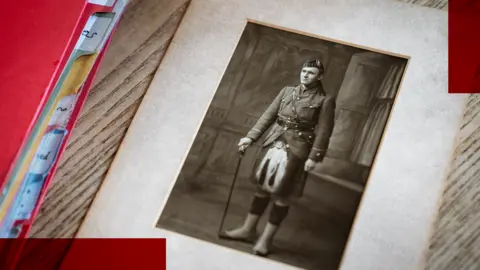
However, the identity of the second Scottish soldier was proving more difficult to establish.
It was thought he had been serving with the Gordon Highlanders, and buttons found on the site in France hinted he could be an officer.
But the search was complicated because he was discovered along with five different sets of remains.
Using war records, Nicola Nash discovered that 14 officers from the regiment had been in the area.
She traced the families of every officer, then DNA tests were carried out.
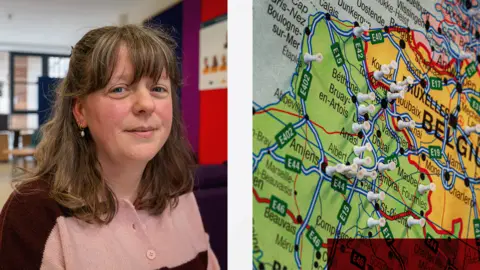
This eventually found a match with the family of James Grant Allan, a 20-year-old lieutenant.
It turned out that his great-nephew lived just three doors away from another member of the war detectives team.
The Allan family hail from Scotland but were brought up in Stroud in Gloucestershire, where Nicholas Allan has run a cafe for more than 20 years.
He and his siblings grew up knowing all about the part one of their relatives played in the Great War.
Nicholas had been at work when he got a phone call from Nicola Nash telling him his DNA sample was a match and that remains found in France were those of his great uncle James Allan.
“It stopped me in my tracks,” he recalled. “The hairs on the back of my neck went up. I was like: ‘Oh my God, why is this happening? Why particularly him [James Allan] and not a thousand others?'”
Only the night before, Nicholas had discovered a family album of photos and letters, many from his Great Uncle Jim.
Nicholas’s younger brother Christopher and his sister Rebekah have been re-reading the letters which were sent home from the front line.
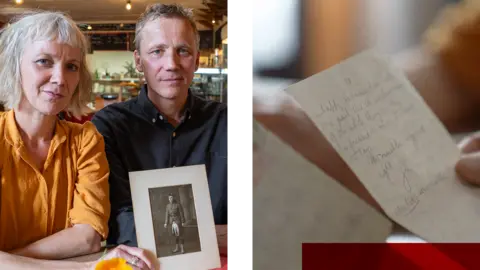
“He was just a little boy… I feel sad that he didn’t live his life,” said Christopher.
Nicola Nash said she felt “a really special connection” with the two soldiers because of how much she learned about their stories.
“And I feel like I have a special connection with the families as well, because they have both been so involved and so brilliant,” she said.
This week, Gordon McPherson and James Allan were laid to rest at the Loos British Cemetery – just a few hundred yards from where they were found.
Alistair McPherson said he was delighted that his relative had finally been found and laid to rest.
“I’m just really, really emotional in a good way, a positive way,” he said. “We couldn’t have wished for a better send-off after all this time.”
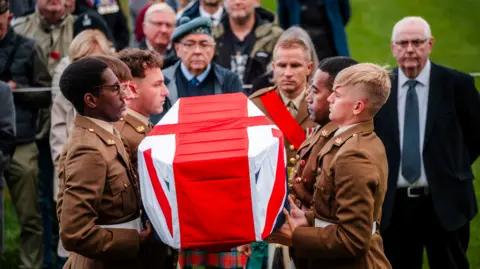 Thomas Capiaux/CWGC
Thomas Capiaux/CWGCAfter the ceremony, Alistair and Andrew were presented with the Newcastle Corporation Tramways buttons in a small framed case, and a folded union flag.
“We’re going to need a bigger black box,” added Alastair.
Nicholas Allan said he was “in awe” of what the war detectives had done, and that he was “so grateful” for their work.
“It’s just been so heartwarming and a real privilege,” he said.
In the past 10 years the CWGC recovery unit and the war detectives have found and buried the remains of more than 300 British soldiers.
While the majority could not be traced, their work has identified 60 of those who died in battle.
Many thousands more are still missing. Some will never be found – but the war detectives say their work will never stop.
Breaking News
Two people die during failed Channel crossing attempt

Read more on post.
Two people have died attempting to cross the English Channel on Saturday morning, French officials have told AFP news agency.
The incident happened overnight off the coast of northern France, when about 100 people set off by makeshift boat to try to get to the UK, authorities said.
Sixty people from the attempt were rescued and are “are currently being cared for by civil protection,” according to French official Isabelle Fradin-Thirode cited by the AFP news agency.
A couple and their child suffering from moderate hypothermia were rushed to a hospital in Boulogne, she added.
French newspaper La Voix Du Nord reported that the two who died were both women.
The incident overnight happened south of the beaches of Neufchâtel-Hardelot in the Pas-de-Calais region.
At least 25 people have died so far this year trying to make the dangerous crossing in small boats.
Earlier this month, three people died – likely in a crush on the bottom of a packed boat – off the coast of Calais during another attempted crossing.
Last year, 50 people died while trying to cross the Channel, according to incidents recorded by the French coastguard.
More than 30,000 people have reached the UK in small boats so far in 2025 and more than 50,000 have crossed since Labour came into power in July 2024.
The UK government has come under increased pressure over the number of small boats crossing into the UK and asylum seeker applications.
Recently France and the UK agreed on a “one in, one out” returns deal, which was designed as a deterrent to stop boats from crossing the Channel. It proposes that for each migrant the UK returns to France, another migrant who had not attempted a Channel crossing but with a strong case for asylum in Britain will come the other way.
Sir Keir Starmer has previously called the crossings “totally unacceptable” and Home Secretary Shabana Mahmood has said the “vile” people-smugglers behind them are “wreaking havoc on our borders”.
Breaking News
West Ham sack head coach Graham Potter after poor run of results

Read more on post .
West Ham have sacked their head coach, Graham Potter, after a poor run of results for the club.
Potter was only appointed in January to replace Julen Lopetegui as head coach on a two-and-a-half-year contract.
In a statement, the club said: “West Ham United can confirm that Head Coach Graham Potter has left the Club.
“Results and performances over the course of the second half of last season and the start of the 2025/26 season have not matched expectations, and the Board of Directors believe that a change is necessary in order to help improve the team’s position in the Premier League as soon as possible.”
West Ham said the process of appointing a replacement was “under way”.
Sky Sports News previously reported Nuno Espirito Santo was among the names being considered.
The sacking comes as the side prepares to face former manager David Moyes’ Everton away on Monday night.
The Hammers’ tough start to the 2025/26 campaign has seen them pick up just three points in their opening five games, with their four losses and sole win against Nottingham Forest leaving the side 19th in the league, above only winless Wolves.
Potter was sacked after winning just six of 23 Premier League games, with his side finishing 14th last season.
His assistant coach Bruno Saltor, first team coaches Billy Reid and Narcis Pelach, and goalkeeper coaches Casper Ankergren and Linus Kandolin have also left the club.
The club thanked Potter and his outgoing staff in its statement, adding the board “wish them every success for the future”.
Potter got the West Ham job off the back of a similarly brief spell at London rivals Chelsea, which saw him in charge for just 31 games between September 2022 and April 2023.
This breaking news story is being updated and more details will be published shortly.
Please refresh the page for the latest version.
You can receive breaking news alerts on a smartphone or tablet via the Sky News app. You can also follow us on WhatsApp and subscribe to our YouTube channel to keep up with the latest news.
Breaking News
Judas Priest release Ozzy Osbourne charity single

Read more on post.
Heavy metal band Judas Priest have released a charity single featuring the late Ozzy Osbourne to raise money for Parkinson’s disease charities.
The former Black Sabbath frontman was diagnosed with the degenerative neurological condition in 2019, and died in July, weeks after a farewell gig at Aston Villa.
Judas Priest, who formed in Birmingham in the 1960s, decided to release a charity version of Black Sabbath’s War Pigs after they were unable to join the band, and other metal groups, at the show due to prior commitments.
Band member Glenn Tipton, who has also been diagnosed with Parkinson’s disease, features on guitar with Rob Halford and Osbourne taking alternate vocal lines on the song.
The track was initially conceived as a tribute video for Osbourne and Black Sabbath before the band suggested turning it into a charity single.
Osbourne and his fellow original Black Sabbath members, Tony Iommi, Terence “Geezer” Butler and Bill Ward, were the last to appear on stage as part of a star-studded line-up for the Back To The Beginning concert in July.
Among the other bands performing were Anthrax, Metallica and Guns N’Roses.
Osbourne’s widow Sharon and children Aimee, Jack and Kelly visited floral tributes laid at Black Sabbath bridge following his death on 22 July in a cortege that weaved through the streets of his home city.
Judas Priest’s rendition of the Black Sabbath classic was released on Friday with all profits donated to the Glenn Tipton Parkinson’s Foundation and Cure Parkinson’s.
-
Politics4 days ago
European Parliament snubs Orbán with vote to shield Italian MEP from Hungarian arrest
-
Culture3 weeks ago
Life, loss, fame & family – the IFI Documentary Festival in focus
-
Culture2 months ago
Fatal, flashy and indecent – the movies of Adrian Lyne revisited
-
Environment1 week ago
Key oceans treaty crosses threshold to come into force
-
Health5 days ago
EU renews support for WHO’s Universal Health Coverage Partnership
-
Culture4 days ago
Twilight at 20: the many afterlives of Stephenie Meyer’s vampires
-
Culture1 week ago
Farewell, Sundance – how Robert Redford changed cinema forever
-
Culture4 weeks ago
What is KPop Demon Hunters, and why is everyone talking about it?











































